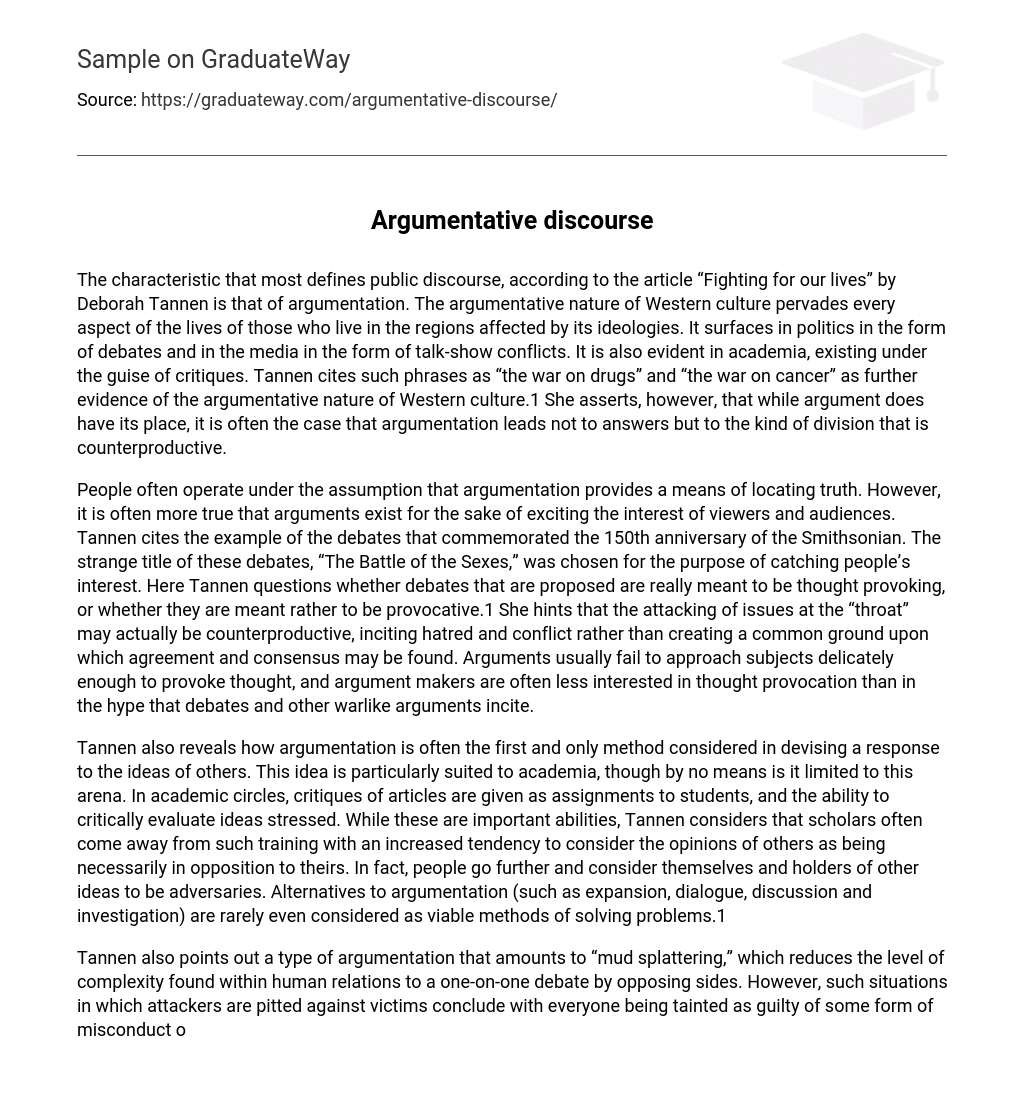The characteristic that most defines public discourse, according to the article “Fighting for our lives” by Deborah Tannen is that of argumentation. The argumentative nature of Western culture pervades every aspect of the lives of those who live in the regions affected by its ideologies. It surfaces in politics in the form of debates and in the media in the form of talk-show conflicts. It is also evident in academia, existing under the guise of critiques. Tannen cites such phrases as “the war on drugs” and “the war on cancer” as further evidence of the argumentative nature of Western culture.1 She asserts, however, that while argument does have its place, it is often the case that argumentation leads not to answers but to the kind of division that is counterproductive.
People often operate under the assumption that argumentation provides a means of locating truth. However, it is often more true that arguments exist for the sake of exciting the interest of viewers and audiences. Tannen cites the example of the debates that commemorated the 150th anniversary of the Smithsonian. The strange title of these debates, “The Battle of the Sexes,” was chosen for the purpose of catching people’s interest. Here Tannen questions whether debates that are proposed are really meant to be thought provoking, or whether they are meant rather to be provocative.1 She hints that the attacking of issues at the “throat” may actually be counterproductive, inciting hatred and conflict rather than creating a common ground upon which agreement and consensus may be found. Arguments usually fail to approach subjects delicately enough to provoke thought, and argument makers are often less interested in thought provocation than in the hype that debates and other warlike arguments incite.
Tannen also reveals how argumentation is often the first and only method considered in devising a response to the ideas of others. This idea is particularly suited to academia, though by no means is it limited to this arena. In academic circles, critiques of articles are given as assignments to students, and the ability to critically evaluate ideas stressed. While these are important abilities, Tannen considers that scholars often come away from such training with an increased tendency to consider the opinions of others as being necessarily in opposition to theirs. In fact, people go further and consider themselves and holders of other ideas to be adversaries. Alternatives to argumentation (such as expansion, dialogue, discussion and investigation) are rarely even considered as viable methods of solving problems.1
Tannen also points out a type of argumentation that amounts to “mud splattering,” which reduces the level of complexity found within human relations to a one-on-one debate by opposing sides. However, such situations in which attackers are pitted against victims conclude with everyone being tainted as guilty of some form of misconduct or crime. “Slash and burn thinking” is also destructive, as the form of argumentation represented here is one that considers only what is wrong with the ideas of the other side. Therefore, the logical and constructive ideas found in the discourse are burned along with the erroneous or unfeasible ideas. And even reciprocal arguments made in defence of a slashed and burned idea leads similarly to destructive forms of cut-throat argumentation.1 Later, Tannen also considers the extent to which such polarities as nature versus nurture have an effect on argumentation.
Deborah Tannen’s main objective is to remind her readers that other ways exist in which people can make their ideas and opinions heard. Since the entertainment that comes with the ferocity of political debates often blinds audiences to the information that the medium should be supplying, she considers it prudent to find alternatives to such methods. She advocates such alternatives that recognize the strengths in others’ arguments even as they point out the weaknesses. Such include looking for several other sides rather than just one other side. They also include the use of dialogue, which succeeds in containing opposition, yet without the ferocity of argumentation.
Cited References
Tannen, D. Fighting for our lives. In Angeloni E, editor. Anthropology Annual Edition. 07/08. New York: McGraw-Hill/Dushkin; 2006. p. 52-60.





